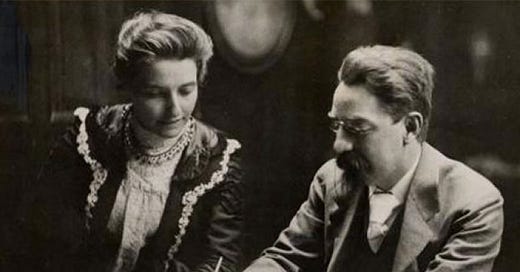Over the next few months, both here on Look, Stranger! and in the pages of Prospect magazine, I will be trying to cast the current Labour government in whatever light is shed by its intellectual past. On each occasion I will take a book which is representative of a brand of thought which has influenced the British Left and show how its residues live on in the present day.
The first piece, which you can read in the version published in Prospect here is a comparison of the thinking about the state which informs Rachel Reeves’s first Budget as Chancellor of the Exchequer with the work of Sidney and Beatrice Webb, the great Fabian pairing who did so much to set the tone of the Labour party. They are giants of the movement and their influence, as the Budget showed, still counts.
Sidney and Beatrice Webb, A Constitution for a Socialist Commonwealth of Great Britain (1920).
The Labour government is already being dismissed as a standard tax and spend administration, as if raising taxes and public spending were some kind of socialist novelty. The verdict is a couple of words short. This is a Labour government which, so far at least, is looking to tax, spend and hope, the hope in question referring to its faith in the capacity of the state. It is standard Labour doctrine, and it is there from the start.
In 1918 Sidney Webb had drafted the euphonious Clause IV of the Labour constitution which committed the party to the public ownership of the commanding heights of the economy. Two years later, with his wife Beatrice, Webb published A Constitution for a Socialist Commonwealth of Great Britain. It exhibits an uncritical confidence that commerce stands in need of government help which echoes through the currently vague arguments for an industrial strategy. “Today it seems, in the Labour and Socialist world”, write the Webbs, “that the vital question is who should give orders and who should obey them – whether the government of industry shall be from above or from below”.
The Chancellor had little option in her Budget but to raise taxes. The inherited state of the public finances is dire and the range of the money raised was momentous. The rise in current spending announced by the Chancellor in the budget was the largest in real terms since the 2000 spending review. Total public spending is now forecast to settle at 44.5 per cent of GDP by the end of this decade, which is almost five percentage points higher than prior to the Covid-19 pandemic. By the end of this decade the tax take is forecast to grow to a record high in peace time of 38.2 per cent of Gross Domestic Product. This takes Britain closer to the spending profile of the European social democracies than the smaller state of America. The verdict from Bloomberg was typical. The budget, in their estimation, “represented a fundamental shift back to big state economics more than 40 years after then-Prime Minister Margaret Thatcher launched her project to roll government back”.
This is a post for subscribers only, either to Prospect or to Look, Stranger! The reading that goes into these posts is great fun and it’s work I’m very fortunate to do but it is work all the same, in the sense that it is a livelihood. Of sorts. So please do consider subscribing to one of those two places.
Keep reading with a 7-day free trial
Subscribe to Look, Stranger! to keep reading this post and get 7 days of free access to the full post archives.




